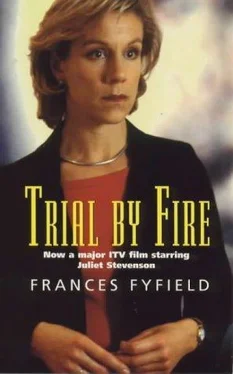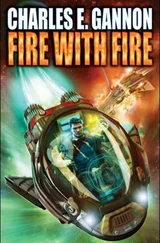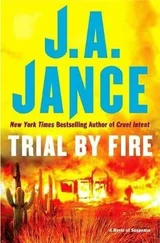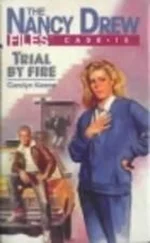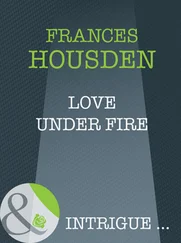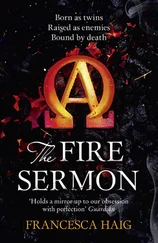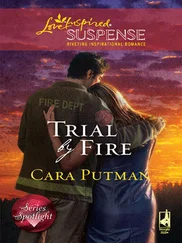Frances Fyfield - Trial by Fire
Здесь есть возможность читать онлайн «Frances Fyfield - Trial by Fire» весь текст электронной книги совершенно бесплатно (целиком полную версию без сокращений). В некоторых случаях можно слушать аудио, скачать через торрент в формате fb2 и присутствует краткое содержание. Жанр: Полицейский детектив, на английском языке. Описание произведения, (предисловие) а так же отзывы посетителей доступны на портале библиотеки ЛибКат.
- Название:Trial by Fire
- Автор:
- Жанр:
- Год:неизвестен
- ISBN:нет данных
- Рейтинг книги:3 / 5. Голосов: 1
-
Избранное:Добавить в избранное
- Отзывы:
-
Ваша оценка:
- 60
- 1
- 2
- 3
- 4
- 5
Trial by Fire: краткое содержание, описание и аннотация
Предлагаем к чтению аннотацию, описание, краткое содержание или предисловие (зависит от того, что написал сам автор книги «Trial by Fire»). Если вы не нашли необходимую информацию о книге — напишите в комментариях, мы постараемся отыскать её.
Trial by Fire — читать онлайн бесплатно полную книгу (весь текст) целиком
Ниже представлен текст книги, разбитый по страницам. Система сохранения места последней прочитанной страницы, позволяет с удобством читать онлайн бесплатно книгу «Trial by Fire», без необходимости каждый раз заново искать на чём Вы остановились. Поставьте закладку, и сможете в любой момент перейти на страницу, на которой закончили чтение.
Интервал:
Закладка:
He knew the purpose of his visit to be tenuous, knew his pocket should contain a search warrant, and had already rehearsed the alternative approach, an example of the kind of benign trickery he had often used: 'If you won't let me in to look at your house, sir, I'm sure you won't mind waiting with this officer here while I go and wake up a magistrate to supply me with the piece of paper that will force you to comply. Up to you, sir.'
And why do you want to search my house, Mr Bailey?'
`Well, I don't rightly know. There are questions lingering here.' `Get out, Mr Bailey.'
He tried the garage first. Open and empty, nothing to steal apart from a bicycle – old, battered, hidden by a tarpaulin. Clearly labelled in Bailey's mind were two preoccupations: letters, and the gleam of gold. Letters taken from Antony Sumner's desk, the ones Amanda had failed to secure so sure was she of their irrelevance. Perhaps other, similar letters she had failed to discover here. And maybe the jewellery worn by the dead woman, the bracelet, earrings, and necklace that Blundell had described so uncannily well, as if he had seen them very recently.
Bailey could not rid himself of the conviction that they were still in this house.
Certainly the man was mean enough to keep them and claim his insurance, but Bailey doubted if that was all he'd been up to. He was clever enough, or maybe simply rich enough, to deflect dear Miss Scott. And every time she shouted "fire," the people answered, "Little liar".' Bailey recited the old rhyme to himself, stopping to survey the front door, trying to decide upon the most appropriate pleasantries for the occupants. Sometimes he managed the most sophisticated approach of all, making himself think and feel like an ordinary visitor, imagining himself with an invitation and sure of a welcome.
People allowed extraordinary privileges to their guests, showed them the sanctum of their own lives, displayed everything from the beams to the contents of the bathroom cabinet without turning a hair. If Bailey could think of Blundell as his host, he might influence events.
Then again, he might not. He could not imagine John Blundell offering him a drink, and the thought reminded him not only of the taste of whisky but of how difficult he would find it to refuse. A whisky would be nectar.
But within feet of the front door, he knew the house was empty, giving off from itself the scent of vacancy. He had spent enough of his life approaching doors and windows unbidden, in the dark, in daylight, in the eyes of storms, and instinct told him immediately when human life was absent. He had learned in the bitter experience of failure how to avoid the pitfalls, and how and where a man could hide indefinitely, learned to sense emptiness and its opposite.
He had sat in a room for two hours on guard, uncomfortable, but unaware of the one silent Indian hidden behind a wardrobe two feet from his own back and still carrying a knife.
Now he knew when to turn, when to look, when to ignore logic and obey his instincts. There was nothing live in this house; he was sure of it. But for all that, the place was lit up like a Christmas tree. Blundell, it seemed, was losing his grip: door unlocked, lights on, not a soul to be seen, like the Marie Celeste. When Blundell left, he had believed his castle to be still occupied.
Bailey shouted into the empty hall and was relieved by the answering silence. Acutely aware, if only for a second, of the dubious legality of his presence, he began to walk from room to room. Kitchen empty and tidy, heart of a heartless house, two glasses on the table.
Living rooms and handsome stairs muffled by carpet and soft beneath the feet. Calling
'Anyone at home?' he trod heavily up the stairs, moved along the hall and into the largest room, being deliberately noisy, both as a warning to others and as a sop to his conscience.
He was indifferent to the fact that this exercise could blight his career, a consideration that had persuaded him to leave Bowles behind to avoid tarring him with the same brush of disgrace for so flagrant a breach of the rules. Bailey forgot the professional madness of his illicit search as soon as he stepped into what was obviously Blundell's room. Handsome mirrored wardrobes lined one whole wall. Wealth consumed by vanity, thought Bailey, opening the first door.
Good God. A row of shredded garments hanging from padded hangers like streamers, resembling tired flags ripped by a malicious wind long after the celebration. Another door revealed more of the same, rags replaced neatly as if the creases of them still mattered; zips gaping like wounds, sleeves in shreds. He was stunned, closed the doors with something like reverence, furious with Amanda Scott, his mind jangling with possibilities, entertaining the thought of Blundell as murderer. Then he put the thoughts back into order, stored the vision of this graveyard of clothing for future reference, went back to the first purpose of his trespassing, left the room, and went to the next.
An unpromising door, bolted from the inside, light from the interior colouring the dark floor in a brilliant band. He had quickly identified the remainder of the upstairs rooms; this door was the only one left for the daughter of the house. Evelyn, darling child, whose writing on a shopping list seen in John Blundell's office bore such a striking resemblance to that on juvenile love letters to a teacher currently in prison. He did not know what was in his own mind other than writing, the gleam of gold, and a familiar feeling under his skin.
Bailey put his shoulder to the door, felt the breeze from the open window beyond as the softest splintering of wood shrugged off a cheap bolt, clumsily constructed as a barrier against a world that had never wanted entry in the first place. More a symbol, this bolt, effective only because it was completely respected. On the other side of the door, a room so Spartan it almost defied occupation: small bed, tacky wardrobe, cheap wooden desk bought for a child, spitefully at odds with the luxury of the rest of the house. A plastic skeleton hanging from cupboard and a hoard of books, tidily placed.
Thin curtains moved in the breeze, flagging the presence of Evelyn Blundell's own back door. A small transistor radio was playing quietly but insistently. He sat in the childish chair by the desk and began to open the drawers. Somewhere out there, walking the streets in the quasi-countryside of this artificial part of the world, looking at the better life, was darling child, a malevolent, determined, and beautiful presence, perhaps protecting a murderer.
Somewhere in this anonymous room was the rest of her, arrogantly undisturbed.
Evelyn sat at the edge of Bluebell Wood, half frozen. She had embarked on her evening enterprises dressed for action, but her cotton T-shirt was inadequate against the cool night. The wood behind her was black. She had no fear of darkness but was chilled by her impatience and the cold. From this end of the wood, she could just see the outline of The Crown in the distance, partially obscured by trees, nothing else visible: her eyes fixed to a point between trees and horizon.
Do it, William, just do it. Put your hand in your pocket, feel your silly plonker, leave it alone, and get out the matches. I couldn't, but you can. Go on, you just don't understand fires; you never did, not even after the first one I made you try. You were too thick; you couldn't even see it was fun. You only like doing that thing. You don't really like anything else except all that foul jewellery you make and, even worse, what you steal, and putting your plonker in me, and I'm so bloody tired of that, really I am. I'm sorry, though.
All that fiddling about wasn't enough to keep you quiet; it makes me mad. I can't stand all that squidgy stuff. You'll talk to that woman you went with yesterday, went back on the bloody train with her, too frightened to go on the tube by yourself. It's no good, William, no good. You'll be like putty. All those questions, it's no good, William; you've got to go. Out like a light. Oh, I'm sorry, I shouldn't have said that, shouldn't think it, even without anyone hearing. She giggled at her own bad taste. I'm sorry, William.
Читать дальшеИнтервал:
Закладка:
Похожие книги на «Trial by Fire»
Представляем Вашему вниманию похожие книги на «Trial by Fire» списком для выбора. Мы отобрали схожую по названию и смыслу литературу в надежде предоставить читателям больше вариантов отыскать новые, интересные, ещё непрочитанные произведения.
Обсуждение, отзывы о книге «Trial by Fire» и просто собственные мнения читателей. Оставьте ваши комментарии, напишите, что Вы думаете о произведении, его смысле или главных героях. Укажите что конкретно понравилось, а что нет, и почему Вы так считаете.
